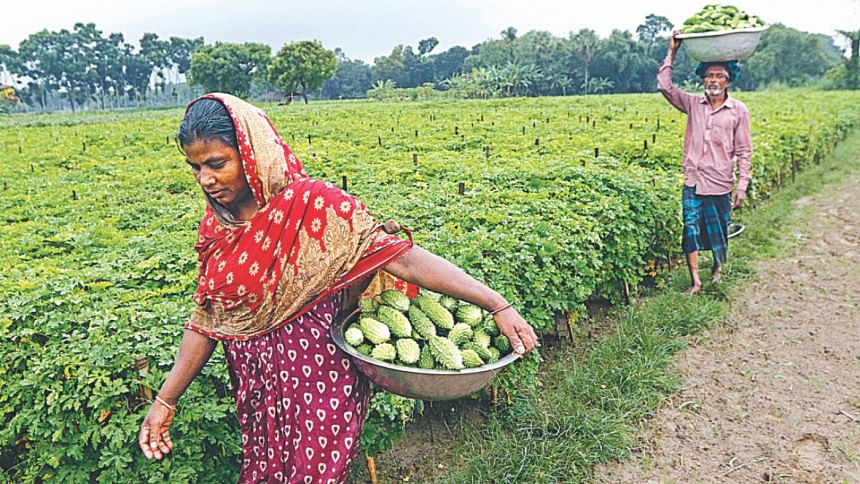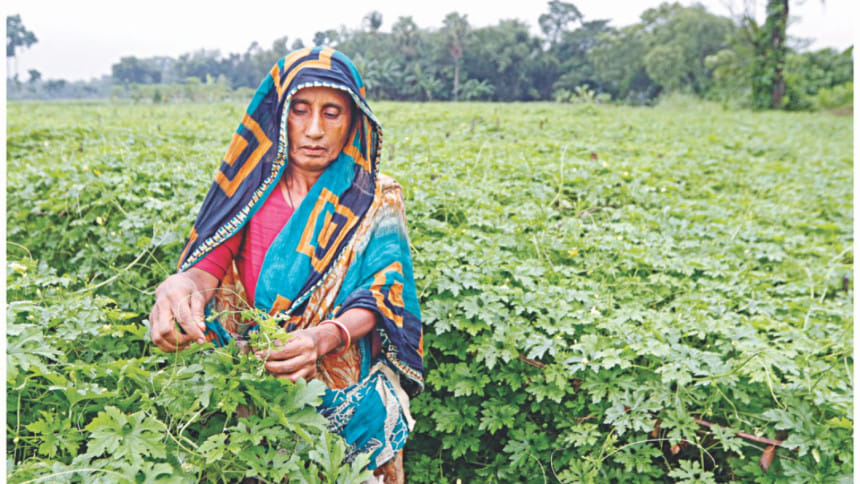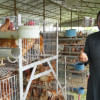The unsung tale of women in farming

Farming is in her blood. As the daughter of a farmer, Shilpi Begum grew up well acquainted with the expertise of growing paddy and vegetables, and rearing livestock. The experience came of great use when she had to shoulder the responsibility of pulling her family, including two children, out of debt, as her husband returned home empty-handed from Dubai around five years ago.
A big chunk of her family's income now comes from selling vegetables she grows on one acre of land deep in Diara Bhabanipur village of Manikganj.
In her late 30s, Shilpi is the only person in the family looking after every stage of farming, starting from cultivating land to harvesting the crops.
According to the Labour Force Survey 2016-2017, Shilpi represents 36.3 percent of the rural working age women population, who are “employed” under the definition of work done “for wage or salary, profit or family gain” and for production of goods for own consumption.
Agriculture that includes livestock and poultry farming, fisheries and homestead gardening is how more than two-thirds of rural working women, like Shilpi, contribute to the economy besides sharing the financial burden of their own families.
FEMALE LABOUR IN A PATRIARCHAL SOCIETY
But Shilpi's day-to-day toil in the field remains mostly unacknowledged and unappreciated by her family. In this patriarchal society, the men in the family are the ones who get the credit and ownership over the money earned, since it is her husband's land she is growing crops on, while her son is the one selling the produce at the market. And so, at the end of the day, the decision making and how and where to spend the money earned depend on them.
After all this hard work, as Shilpi put it while tending to pumpkin saplings on Thursday, patriarchal households believe “we are doing our work”, meaning playing the role of a woman in a family.
Women like her step into the labour market, as the survey places them in the category of being employed, but fail to reap the benefits.
“They don't get the financial freedom or independence that paid jobs offer,” said Sayema Haque Bidisha, associate professor of the economics department, Dhaka University.
Over the years, women's participation in agriculture has increased from 58.90 percent in 1988 to 76.7 percent in 2016.
The present scenario is a result of, among other factors, the migration of men to urban areas for jobs, leaving women to look after their in-laws' familial land, Sayema added.

THE 'UNEMPLOYED HOUSEWIFE'
This restriction on physical mobility and unequal share of household responsibilities between men and women keep the latter away from the mainstream job market, causing them to be financially crippled, Sayema said.
The status of those only engaged in household chores and taking care of children and the elderly is worse since no survey by the Bangladesh Bureau of Statistics or any other national agency highlights their contribution to familial and social development.
They are seen as “doing nothing”, while their families and communities thrive because of the services they provide-- ones that money cannot buy.
These “unemployed” women account for more than 60 percent of the rural women above the age of 15, as per BBS's latest survey on labour force.
In the latest survey, 80.5 percent of the women excluded from the labour force said family and household work is a setback to their employment. It was 72.4 percent a year ago.
Against this backdrop, women's contribution is not valued or undervalued irrespective of whether their work brings money, like in the case of Shilpi, or not.
Rights organisations have long been demanding the economic evaluation of women's unpaid work and presenting it in the national Gross Domestic Product (GDP) so that their contribution is valued and their status upgraded.
In one such attempt, Manusher Jonno Foundation commissioned the Centre for Policy Dialogue (CPD) to conduct a research on women's contribution to the economy in 2015.
The study estimated the value of women's unpaid household work at 76.8 percent of GDP in fiscal 2013-14, when another woman would be hired and paid to replace the woman in the family doing unpaid work.
And if the woman in a family went to do the same thing in another family for a negotiated pay, the value of women's unpaid work would be equivalent to 87.2 percent of GDP.
PARTICIPATION IN ECONOMY
If the government carries out such evaluations on a regular basis and publishes them, it will help create awareness among people, said Towfiqul Islam Khan, a senior research fellow at the Centre for Policy Dialogue (CPD), who was in the team that conducted the research.
The second step would be to encourage men to take up a higher share of household burden, facilitating women's direct participation in the economy, he said.
The CPD study found that a female member of a household does 12.1 activities a day on an average while a male undertakes only 2.7.
The third step should be increasing women's access to land, other properties and resources to make means of self-employment available to them, Towfiqul added.
The government is yet to act along these line but its policies, for example National Women Development Policy 2011 and National Agricultural Policy 2013 suggest that it fully comprehends the need to value women's unpaid work.
“The direct and indirect labour in agriculture and participation of women is recognised worldwide. So the women labour as farming hands … need recognition,” as said in the women development policy.
It further said the government would ensure correct reflection and evaluation of all women labour including their labour in farming and in the household in the national accounts of development and economic growth.
In the seventh five-year plan, the government acknowledges that the progress in economic equality was not significant as stipulated in the previous plan for the period of 2011-2015.
Women's access to important factors of production such as land and credit is one area where the country is lagging behind.
After all, development will not be sustainable if half of the population doesn't participate in the economy.
It seems true even when the focus is zoomed in on smaller units like a family. A couple, Sukurjan Begum and Abdul Aziz have set an example of success through equal partnership in vegetable gardening on a leased-out land in Manikganj.
When asked who does the farming, Abdul said with a grin, “We both do… Our family depends on this”, as both husband and wife plucked bitter gourds from their garden.

 For all latest news, follow The Daily Star's Google News channel.
For all latest news, follow The Daily Star's Google News channel. 







Comments